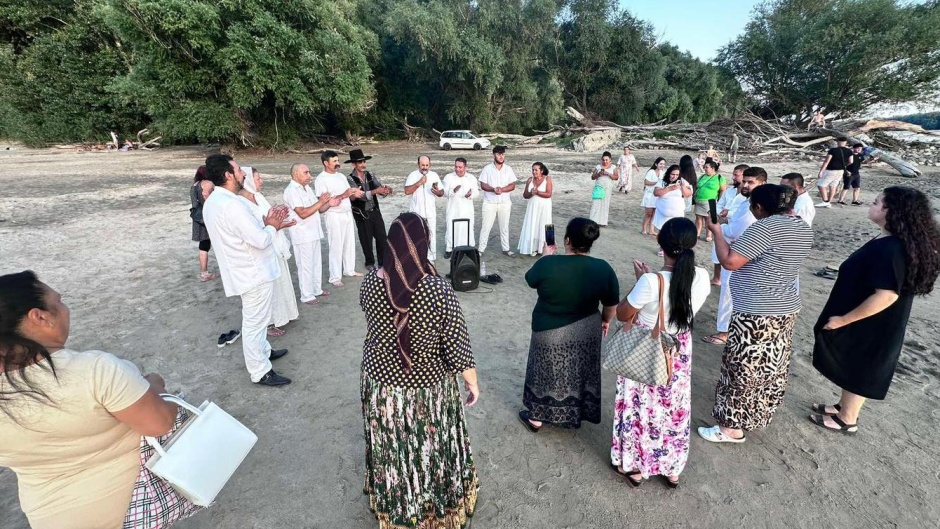Good news among the Roma: “Christ welcomes and raises us all”
The situation of the + 30 million gypsies across Europe is similar. They are the excluded ones, the ones kept at a distance.
13 DECEMBER 2024 · 11:10 CET

Many years ago, the Hungarian Evangelical Alliance took me to see the amazing Hope Centre, a ministry of Hungarian Gypsy Missions International (HGMI) who are active members of EEA’s Roma network.
Since then, HGMI has grown from employing 30 people to 1300! Its work is having a tremendous impact across Hungary.
In September, I was able to ask HGMI’s President Albert Durker more about their ministry and what he would love to share with the wider EEA family.
HGMI’s work is in Hungary but Albert started by explaining that the situation of the + 30 million gypsies across Europe is similar. They are the excluded ones, the ones kept at a distance.
They wander from place to place but many have been forcibly settled in separate communities of poverty. Sometimes, their own languages have been banned. They continue to face prejudice and a multitude of barriers.
They wander from place to place but many have been forcibly settled in separate communities of poverty. But across Europe, the people who are most turning to the Lord are gypsies and immigrants
HGMI’s vision is bolder still. They believe that it will be the Roma community who give the example for others to follow, who shame worldly thinking, who show and share God’s light so that many will turn to Christ.
“Anyone who wants to invest in the Kingdom of God will potentially see the biggest return through investing in Roma ministry,” said Albert, with a twinkle in his eye.
I asked what the keys were to working with Roma people. Number one is that we should love. Roma thirst for love and will work with the majority population where there is love.
Secondly, find key people to disciple, both young people (because they will be bold in new thinking) and those with authority in the community that others will listen to. And then find a way to balance the influence of these two groups.
Thirdly, train these disciples to plant small church congregations, linked together, in local settlements. Across Hungary, this work is accelerating. In the past 3 years, the number of Roma churches has doubled.
It is completely normal for HGMI to minister to the whole person and to the whole community, to engage in holistic mission, tending to spiritual, cultural, social, educational, health and practical needs.
Their church planting pastors are called community transformation leaders. They, in turn, train up community transformation workers. They run both a church but also a local NGO, providing whatever the community needs.
As they provide the community service, there’s a sign saying that they are from the church. Wherever possible, they get involved in local politics and aim for good relationships with the mayor.
Albert sees that doors are opening for positive political influence. Born again gypsies are in both gypsy councils and wider local councils. The national head of the Gypsy Councils is a Christian. Even the nation’s Secretary of State for Gypsy Affairs is a Christian.
I asked how HGMI managed to get secular funding for much of their community work when it is inextricably connected to their spiritual mission.
Their model is the book of Esther where God is powerfully at work, saving His people, and yet His name is never mentioned in the story.
HGMI uses secular vocabulary like mentoring and training or community transformation. The funders are not naïve. The spiritual heart of the work is obvious. But the impact on the community, educational & health standards, employment etc. is clear. Results deserve to be funded.
But are there still problems? Yes! Prejudice is still massive. The day before our conversation, Albert had visited an agricultural area where Romanian gypsies are invited to come to work. However, the local community do not actually want to see them!
They don’t want them in their shops or streets. There had been a gypsy church for 150 in the town but there were constant complaints because the locals saw the Roma gathering.
This summer, the church was accidently destroyed by fire. Albert had gone to the local mayor about rebuilding the church. The mayor requested that they relocate the church in the fields, outside the town.
How does Albert want the wider Church to help?
When it comes to injustice, it was no surprise that he requested that people stand with them, partner with them, speak up with them when the community is attacked.
And, when an individual gypsy can’t get a job because the post is mysteriously, suddenly, supposedly “filled”, can we provide character references?
The conversation ended with Albert saying “The wider Church does not need to feel it needs to lift Roma up. Only God through Christ does that. He does that for all of us. We are all the same. Christ welcomes and raises us all”.
“Turn towards us, hug us and then Roma will be raised up. Let’s work together.”
If you would like to know more about the work of Hungarian Gypsy Missions International (HGMI), please go here.
Julia Doxat-Purser, socio-political representative of the European Evangelical Alliance. This article was first published by the EEA and re-published with permission.
Published in: Evangelical Focus - European Evangelical Alliance - Good news among the Roma: “Christ welcomes and raises us all”
